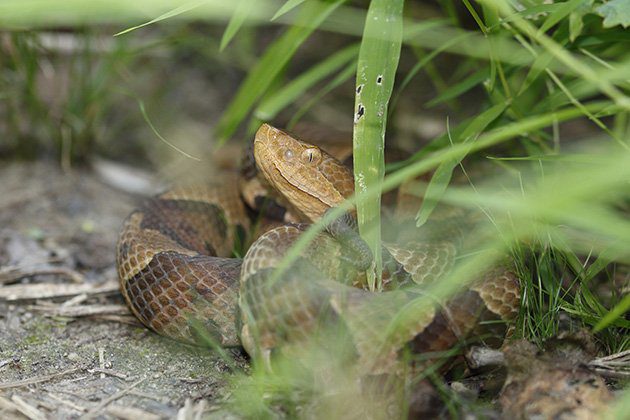Snakebites can be a serious threat to dogs, and it is important for dog owners to understand the potential consequences and how to react in case of an incident.
Snakebites in dogs typically occur when a curious dog encounters a venomous snake while exploring outside. The most common venomous snakes in North America are rattlesnakes, copperheads, and water moccasins. Dogs are especially vulnerable to snakebites because of their natural curiosity and tendency to investigate their surroundings with their noses and mouth. When a snake feels threatened, they will bite in self-defense. And because there are different types of snakes – venomous and nonvenomous – not every bite is created equal.
Nonvenomous snake bites in dogs are a common occurrence in areas where snakes are prevalent. Although nonvenomous snakes do not possess any venom, they can still cause significant pain, swelling, and infection at the site of the bite. The most common types of nonvenomous snakes that bite dogs are rat snakes, garter snakes, and bull snakes. Symptoms of a nonvenomous snake bite in dogs include swelling, pain, bleeding, and a discharge of pus or blood from the bite wound. Treatment for nonvenomous snake bites in dogs typically involves cleaning the wound, administering pain medication, and sometimes antibiotics to prevent infection. If the bite is severe or located in a sensitive area, such as near the eyes or mouth, veterinary care should be sought immediately.
What Are Signs of Snakebites on Dogs?
If your dog has been bitten by a venomous snake, look for signs of extensive and quickly spread swelling, bleeding or bloody discharge. You may not always see the puncture wound from the fangs so keep that in mind. Some snakes may be too young or too small for the puncture wounds to be visible, plus the swelling usually makes it harder to see.
Keep in mind that even if your dog has been bitten by a venomous snake, they don’t always inject venom. Seek help immediately to avoid any health threats to your dog.
Seeking Treatment
If your pet is bitten by a snake, assume it’s a venomous bite and seek veterinary attention immediately. It’s always better to be proactive than waiting and potentially regretting it if your loved one rapidly gets worse.
A painful snakebite could cause your dog major stress. It may be important to muzzle your dog to avoid being bitten. Make sure that you keep your dog in a calm, quiet and warm state. This helps reduce stress in your dog and keeps them as comfortable as possible while you seek help. Stay calm. Your dog can sense when you are panicked and high stress levels can cause the venom to circulate even quicker throughout the body.
If for some reason you are unable to take your dog to a veterinarian right away, here are some things that you can do to help minimize the spread of venom:
- Rinse the bitten area with water to rid the wound of excess venom.
- Keep the bitten area below the level of the heart to reduce blood flow to the area.
Treatment Depends on These Important Factors
Treatment is varying. It all depends on the size and species of the snake, size and age of the dog, and location of the bite. If you’re able to, show your veterinarian a photographs of the snake or try to describe it with as much detail as possible. Depending on which species, treatment could involve antibiotics, antihistamines, fluid therapy, treatment for shock, and antivenin.
It’s common for a pet to be hospitalized for 12 hours following a snakebite. Sometimes, it is recommended that your pet stay in the hospital for 24 hours depending the severity of the bite.
In general, snakes like to avoid people and dogs. If you happen to see a snake, be sure to avoid the area where the snake is located. Keep your dog on a leash to prevent them from scaring the snake and causing it to go into a self-defense mode. Snakes are prone to spending time in holes, on logs or on rocky areas. Be alert and be cautious while hiking around these kinds of areas.

